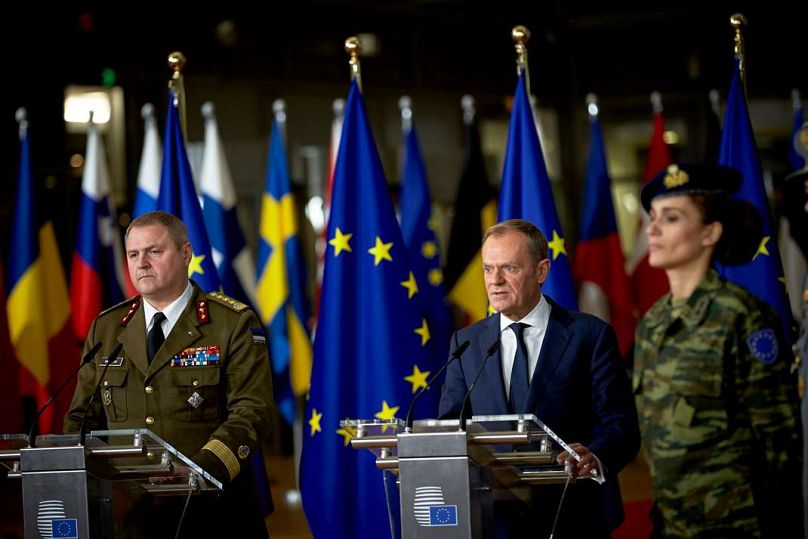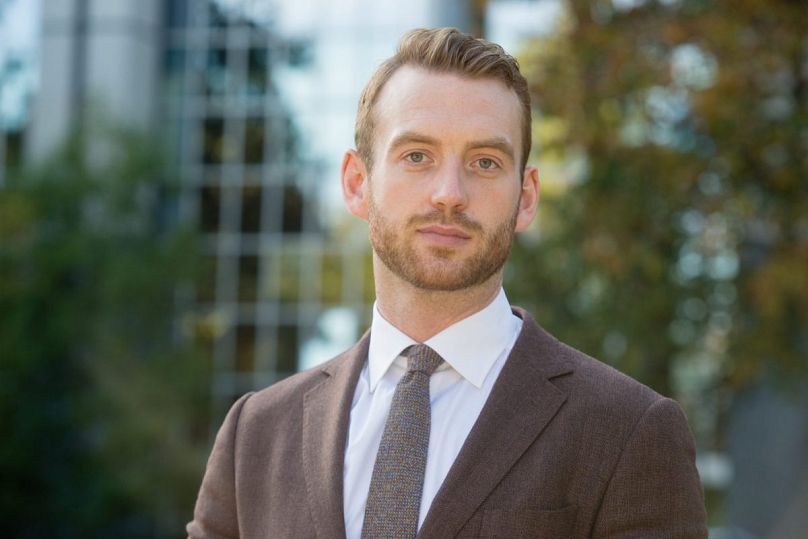Until Brexit happens, anyway.
Lawmakers in the European Parliament have started the new term this week — but there are some politicians who are left on standby due to Brexit.
The EU Parliament had planned for the UK's exit from the bloc by divvying the kingdom's 73 seats. This included setting aside 46 seats for possible EU enlargement. The other 27 would be spread across 14 other countries in a bid to balance out representation.
But Brexit didn't go as planned.
The March deadline passed and the UK took part in the European elections as the deadlock in British politics continued. The countries that were slated to scoop up those seats, including Romania, Poland and France, now have their politicians on standby — known as reserve or 'cold storage' MEPs — for when (or if) Brexit happens. Euronews spoke to some of these potential members of parliament ahead of the first assembly.
'It's difficult'
Barry Andrews is one of two reserve MEPs in Ireland. The politician with Fianna Fáil, which is aligned with liberal group Renew Europe, told Euronews about the challenges of being in limbo.
"It's a very difficult situation to be in because I had to take a sabbatical, leave of absence from my old job which I naturally can't return to now. So employment is tricky at this point."
There's also the effect it's had on his family as they wait out October 31, the Brexit deadline given to the UK to leave the EU.
"I think they're all sort of frustrated. We all put in a huge effort as you can imagine with any election campaign so it's not sustainable beyond a certain period of time."
"October is just about manageable, but after that you really have to think about what to do next."
"If there's an extension to facilitate a second referendum, you'd be into periods of time I think of at least a year with an extension. Then I, and I'm sure all other MEPs in my position, would require seeking out alternative professional opportunities."
'I hope the Brits do not leave'
Despite the uncertainty, Andrews would prefer the UK stay in the union even if it means missing out on the opportunity of serving as an MEP.
"I'll be happy not to take my seat if it meant the UK staying in the European Union. I'm not sure how that could happen at this point, but I think that would be the best outcome."
"When you talk about the impact of Brexit, Ireland suffers the consequences of this to a dramatically greater extent than any other EU member state, so you won't find anybody here (in Ireland) in favour of Brexit."
Riho Terres, a former Commander of the Estonian Defence Forces, also hopes the UK doesn't leave the EU. The retired army general is not new to the EU stage, having met with EU Council President Donald Tusk in 2017 in his previous role as chief of general staff of the Estonian defence force. But he entered politics in March for the European election race, joining the conservative Pro Patria party which is housed within the centre-right European People's Party.
"First of all, I hope the Brits do not leave. Because I still think that it's not a good idea," he said.
"I think the UK has been a reliable, important partner and has a very big market — so it would be bad for the UK and the European Union if the UK would leave. I have always been rather against Brexit."
The precariousness that comes with being a reserve MEP does not have as strong a bearing as others because he is based in the Netherlands. His wife, Kaili Terras, is the Estonian ambassador to the Netherlands and the two are based in the Hague.
"It's not a problem at all. I'm working with my company and as long as [Brexit] remains unclear I keep working and keep doing the same thing I did. So it's not something that affects me seriously."
Terras currently leads the defence division of a robotics company, but he also keeps up with the latest news from within the Brussels bubble and has some priorities that he hopes the European Parliament will consider.
"I would like to see more equality between the states. The talk about "new" and "old" states I cannot understand that."
"We have been a member since 2004 but people still call us a "new state"... I think the more equality between the states — if you look at what our farmers get compared to the so-called mature European countries. So equality between the states would be very important."
"I don't think the 27 seats that are now on the backbench will make a big difference. I'd rather hope that the Parliament already elected will deal with it and we just come in if Brexit happens."
"If I get a seat I will do all the best I can to stand for the values I represent."
While Andrews and Terras wait from the outside to enter Parliament life, there are also outgoing MEPs who will leave Brussels while waiting to take up the cold-storage seat.
Jakop Dalunde, a now-former MEP with the Greens, will be spending more time at his home constituency in Sweden.
"The situation is easier for me since I'm already installed in Brussels and it makes the transition for me easier ... it's much more difficult for people who might have a normal job in their home country and don't know how to plan their lives until they become an MEP in November," he said.
"I have some money saved so I don't plan on taking a job immediately. But if there's another extension in October then I will have to start to plan my life differently and go back to Sweden and seek employment."
All outgoing MEPs qualify for a golden parachute scheme if they have been in office for at least one year, which Dalunde has, making the financial repercussions of uncertainty more palatable.
READ MORE | What are the perks of being an MEP? Euronews Answers
While he's ready to take his seat if required come 1 November, the Greens politician also hopes the UK remains in the EU.
"First and foremost, ideologically I'm against Brexit. I think it's bad both for Europe and the UK, so I'm not hoping for a Brexit in any way even though it would provide an opportunity for me to go back and make Europe greener," he said.
"The main downside for me is that I don't get as good of an opportunity to navigate within the group in terms of who gets which committee and who becomes a coordinator in such a committee."
Dalunde's situation is somewhat lighter because he does not need to relocate any family or pets. "I'm actually lucky. I think it's much worse for other reserve MEPs who have a more difficult time with planning their lives with their family."
The Swedish politician said much of his time since the election has been ensuring all of his staff were employed by new MEPs or within the Greens Party.
In the meantime, he will spend most of his time in Sweden further fulfilling his role is a board member of the Swedish Greens Party.
With the UK leadership race down to Boris Johnson and Jeremy Hunt, Euronews asked for his thoughts on frontrunner Johnson ahead of the leadership contest to replace Theresa May.
"He's a bit of Dr Jekyll/Mr Hyde. There seem to be two sides to him. On the one, sometimes you see that he's a brilliant political thinker and the other second you see he's a clown. I can't really understand who he really is," he said.
"I think it's really disingenuous of the British political class to make the British public think that that is possible. I think they're really creating a big problem for themselves in terms of public trust in politicians, and I think they're going to blame it on Europe — and that's bad."













